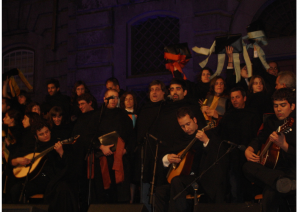Along the years, many students of mine have been asking me what are the main differences between Brazilian Portuguese vs European Portuguese.
Today I am going to try to answer this question in the most accurately way possible, trying not to step in anyones´ toes.
First and foremost, the main difference is that Brazilian Portuguese may sound to many people as a far more cheerful language than European Portuguese.

In fact, I am not sure if we are sadder than the Brazilian people or not (we do have the Fado, though, while they have the Samba, so maybe there is some truth behind it…).

I recently recorded a YouTube Live with Virginia, a teacher that teaches Portuguese from Brazil, where we talked about the differences between both variants of the language. Here is the video about the differences in grammar:
And here is the video about differences in pronunciation:
It’s all about the sounds of the language
A funny thing that happens frequently is that people who do not know European Portuguese often think the Portuguese way of speaking resembles the Russian language and this has to do in part with the richness of our phonetics (sounds). In fact, as I normally say, we can produce sounds that go from our throat up unspeectil the top of our nose, passing all the places in between (Russian is also this way, and hence the confusion!).
Therefore, while our neighbour romance language speakers (speakers of Spanish, Italian, French) show in general some difficulties to speak other languages, we seem to perform quite well at it. I am not bragging, in all honesty. We only speak other idioms with ease, because as I already pointed out we have the luck to have a richness of sounds that other languages don’t (and, to be honest, we really like to please others, so that might be another reason..).
But yes, this leads us back to European Portuguese vs Brazilian Portuguese. If you hear a Brazilian man speaking with a Portuguese one, you might at first think that they are talking in complete different dialects – while the Brazilian man will open his mouth and say all the vowels in a sounding way, the Portuguese will seem a bit sadder or at least more shy in the way he is pronouncing his vowels.
This peculiarity (the fact that European Portuguese speakers “eat” their vowels), is another reason why we sound so different from the other Romance languages and the Brazilian variant, which are more closely related to each other in terms of pronunciation.
In addition, some of the words are totally different or have a totally different meaning, but that is not a problem for the Brazilians and Portuguese to understand each other. Think of it as more or less the difference that you would encounter between British English and American English.

But let´s take a look at these and other differences in more detail.
Brazilian vs European Portuguese Pronunciation |Are there any differences?
Vowels
Brazilian Portuguese (henceforth BP) – vowels are open, sonorant (always pronounced):
ex: Excelente –> “Eshcilentshi” (not only are all the vowels read, but they are also sometimes transformed into something more sonorant; in this case the last “e” becomes an “i”);
European Portuguese (henceforth EP) – vowels are or shortened or completely disappear:
ex: Excelente –> “Shelent” (The first vowel totally disappears, as well as the last one, which makes the word sound very different from its original spelling).
Many other examples of this phenomenon called “vowel reduction” or “epenthetic vowels” in the world of linguistics can be found in the European Portuguese variant of the language, but this phenomenon is hardly existent in Brazilian. This may look like a minor difference, but in fact this is the main difference why both types of Portuguese sound so distinct.
Consonant “S”
BP:
- Final “s” –> when pronouncing the final “s” sound, Brazilians in most states will pronounce it as it is written, i.e, just a normal “ss” sound (note that in some states of Brazil, like Rio de Janeiro, the “s” sound is more similar to the EP variation).
ex: Pedras –> “Pedrass” (stones)
EP:
- Final “s” –> This time EP speakers transform the “s” sound into a “sh” sound (in fact, we LOVE this sound and we produce it many times, therefore the confusion with the Russian language, which also uses this sound a lot).
ex: Pedras –> “Pedrash” (stones)
Other differences in pronunciation
BP:
- “de” and “di” –> when pronouncing these set of letters, Brazilians tend to insert an invisible “j” sound between them, like this –> “dji”;
ex: Cidade –> “Cidadji” (city)
Dinheiro –> “Djinheiro” (money)
- “te” and “ti” –> The same happens in this case, but this time Brazilian speakers tend to insert a “sh” sound in between the consonant and a vowel, transforming it into this –> “tshi”.
ex: Noite –> “Noitshi” (night)
Tiago –> “Tshiago” (Tiago – a man´s name)
Note that once again the final “e” becomes an “i” sound (“eh” becomes “ee”).
EP:
- “de” and “di” –> “de” “di”;
ex: Cidade –> “Cidad”
Dinheiro –> “Dinheiro”
- “te” e “ti” –> “te” e “ti”.
ex: Noite –> “Noit”
Tiago –> “Tiago”
Unlike BP, EP does not insert anything in the pronunciation of this set of letters, but on the other hand, it deletes some of the vowels at the end, because of the phenomenon of “vowel reduction” that I explained above.

Brazilian vs European Portuguese Vocabulary
Let me show you some words!
BP – EP – English Translation
- Trem – Comboio – Train
- Moço/Garoto – Rapaz – Boy
- Moça/Garota – Rapariga – Girl (do not use “rapariga” in BP, as it is offensive!)
- Legal – Fixe – Cool
- Papo – Conversa – Chat
There are many more words that are slightly or completely different in BP and EP, and if you want to know more, I will be providing a list of words in a later post.
If you want any specific word, you can also just ask in the comments below.
What are the differences in Grammar?
Use of Gerund
BP
Brazilian speakers love the gerund. Therefore, when they want to say “I am speaking”, they build the sentence by conjugating the verb “to be” (estar) and adding to the main verb “to speak” (falar) the “ing” equivalent in Portuguese, which is “ando” (for verbs ending in “ar” – first conjugation verbs), “endo” (for verbs ending in “er” – second conjugation verbs) and “indo” (for verbs ending in “ir” – third conjugation verbs). Let me make it more visual:
Verb “to be” (estar) conjugated according to the person + verb without the ending + ando/endo/indo
ex: Estou falando –> I am speaking
Estou comendo –> I am eating
Estou indo –> I am going
EP
The Portuguese do not use the gerund very often. Some literary texts have it and some areas of Portugal (like Alentejo – for more infos on this area, please keep checking my “Culture” page) use it more. However, the continuous tense is normally built in the following way:
Verb “to be” (estar) conjugated according to the person + a + main verb in the infinitive form
ex: Estou a falar –> I am speaking
Estou a comer –> I am eating
Estou a ir — I am going
Question Order
BP:
- O que você disse? (What did you say?) –> Order: Subject – Verb (use of “você” in informal situations).
- O que o senhor disse? (What did you say?) –> Order: Subject – Verb (use of “o senhor/ a senhora” in formal situations).
EP:
- O que é que tu disseste? (What did you say?) –> Order: Subject – Verb, with the use of the clitic “é que” (use of “tu” in informal situations).
- O que é que o senhor disse? (What did you say?) –> Order: Subject – Verb, with the use of the clitic “é que” (use of “o senhor/a senhora” in formal situations).
- O que disseste/ disse? (What did you say?) –> Order: Subject – Verb without the use of clitic “é que”; it only can be used like this when the subject is null and implicit, i.e, it does not appear overtly but one can understand which subject one is talking about.
- O que disseste tu? O que disse o senhor? (What did you say?) –> Inverted Order: Verb – Subject with no use of the clitic “é que” and no null, implicit subject (the subject is explicit).
If you read this text with attention, you saw that the Brazilian variant discussed above does not appear on the Portuguese variant, and this is because it is not correct to ask “O que você disse” or any other variations of this sentence, keeping the normal order of the sentence without hiding the subject or adding the clitic “é que”.
Thus, this part of asking questions might bring you a lot of questions too (see the irony?). If this is the case, or if you didn’t understand something, please leave me a note below or write me an email. This applies also to any other question you might have.
I have another YouTube video where I am speaking with a Brazilian teacher about the differences between both variants of the language. Check it out here:
Feeling overwhelmed? Don’t worry!
There are quite some differences between European Portuguese and Brazilian Portuguese, but at the end of the day and after getting used to the different variations of sounds, we all understand each other.
I think this will also happen to you, once you get more familiar with this amazing and rich language and all its curiosities.
If you want to start learning Portuguese in a relaxed and structured way make sure to check out my European Portuguese Master Course.
Do you know any other words that are different between Brazilian Portuguese and Portuguese spoken in Portugal? Let me know in the comment section below. 🙂
I will leave you for today but I will be more than happy to respond to any further questions you may have about this or other topics and to hear about the progress you are making with your learning process.
See you soon and beijinhos,
Mia.


I find the pronunciation of “R’s” to be a major difference between European and Brazilian Portuguese. A syllable initial or final “R” is pronounced like an English “H” in most of Brazil. It is pronounced rolled, as in Spanish, in most of Portugal.
However, to me, the most significant difference, by far, between the two variants is the 2nd person. As a native English speaker, I have done some formal studies of languages, in the following order: Spanish, German, and Japanese. I started a French class one time (university level), but found I couldn’t learn it and dropped after 2 or 3 weeks. I’ve now been in a French “meetup” group for several years, where I’ve gradually learned to converse to some degree, although with atrocious grammar. I don’t care about the grammar because my sole purpose is to be able to at least minimally communicate in countries that are bilingual in French and not in English (like Madagascar). Portuguese I studied individually, beginning with my fascination with and desire to understand Bossa Nova and “MPB” (Brazilian popular music). This means that I was exposed to native speakers, all Brazilian. I later supplemented that approach with books.
From Day 1 of these language studies, I was dismayed to learn of the formal and familiar forms of You in Spanish, and later in German and French. (It’s a whole other, very complex story in Japanese, but ultimately easier to deal with.) These studies began decades ago, and to this day I remain not only dismayed but sometimes downright anguished by the distinction. (It applies the most in Spanish, where the use of Tu ,Usted, and vosotros varies from country to country, and I’ve been in almost every Spanish speaking country that exists.) I cannot tell you the JOY I found in learning that Brazil has almost totally ditched this system. I won’t claim to have a great deal of experience in Brazil, but three trips of about two weeks each count for something. The first was a guided group tour so I wasn’t required to use Portuguese, but I did to the extent that I could. The second trip was with private guide, but ability to use some Portuguese when the guide wasn’t around helped me considerably. On the third trip, I had managed to get myself invited onto a research boat (!) into pristine areas of the Pantanal wetlands. It required me to fully communicate in Portuguese as I had to get to a very remote area on my own in order to board the boat.
I was sensitive to language on all these trips, the ones where I didn’t need Portuguese and the one where I did. In those approximately 6 weeks, I heard the use of “tu” exactly one time. It was by a mother speaking to her young child, maybe 3 or 4 years old. I heard other mothers address their children of similar age as você. I heard the use of “o senhor” exactly 3 times. The first time was on that group tour, but you occasionally find yourself apart from the guide on such tours. I said something (I don’t remember what) to a child of maybe 7 or 8 years. He answered me, then asked, “Como a senhora aprendeu a lingua portuguesa?” So he had been taught to address his elders as “o senhor”. The second time I heard this form was on the same tour. Group members on this tour included Brazilians themselves, Argentines, and Americans. I heard one of the Brazilians, a girl of about 20, address one of the Argentines, a male old enough to be her grandfather, as “el señor”. She knew Spanish and was speaking it with him, and translated “o senhor” into Spanish. She didn’t know that Spanish didn’t have this form, and was as confused by his reaction as he was confused by her statement. He thought she was talking about God! The third time I heard this form was in a restaurant, where the waiter addressed me as “a senhora”. This he undoubtedly did to show respect to his customer, but it had the opposite effect of actually offending me. I love, love, love, that everyone is você in Brazil. Why did he feel the need to use this formalistic, and undemocratic form with me? But in speaking with him, it came out that he was from Colombia. So his use of o senhor was of no consequence to Brazilian Portuguese, since he wasn’t Brazilian. As a native Spanish speaker, he felt as uncomfortable addressing me democratically, as I felt in being addressed undemocratically! Incidentally, I’m aware that some areas of Brazil that I haven’t been to do regularly use “tu”. This is true, for example, in the far south, where a lot of people are of German or Italian descent. Their not so distant relatives brought “tu”/”du” across the Atlantic, and they haven’t been able to shake it, so they use “tu” in Portuguese. Funny thing is, they don’t know the conjugations for it, so they just use “tu” as the subject, along with the conjugations belonging to você . Aside from this kind of aberrant situation, “você” is nearly as exclusive in Brazil, as “you” is in English. Remember that we do have the formal/familiar distinction in English, but the familiar has long been relegated to occasional religious use: thou shalt and thou shalt not.
Olá Robyn.
Thank you for your comment 🙂
I just wanted to say that the rolled “r” as in Spanish is only used in certain parts of Portugal, but definitely not in most of Portugal. In fact, most Portuguese people can’t roll their “r” like this, and they end up saying “Jamon” (which means “ham”) instead of “Ramon” (name of a person), which makes for funny situations when Portuguese people try to call their spanish friend Ramon and end up calling him ham. 🙂
The “r” in European Portuguese is normally more gutural and sounding like the “j” in Spanish, therefore the confusion 🙂
About Spanish, I know they have simplified it (at least in Spain) and that’s definitely making life easier for everyone.
I also know that in Brazil the use of “você” has taken over the use of “tu”. Although, I also know that “tu” is used with the wrong conjugation in some states of Brazil, which I find quite cute 🙂
I am glad that you are finding your way through these languages, though. Thank you for letting me know about your journey.
If you need any help from me, please let me know 🙂
Beijinhos,
Mia
Muito bom o texto!:) Essa visão que os estrangeiros tem do samba/carnaval é até bastante engraçada , porque o samba não é um ritmo difundido em todas as regiões do país. Na verdade ele bem restrito a um estado, e olhe lá, Rio de Janeiro. Isso é uma imagem meio que forçada que é vendida do Brasil. Eu moro no nordeste do Brasil, uma área imensa do país com uma população gigantesca, e aqui ninguém fica escutando samba. A principal festa popular não é o carnaval, e sim a festa de São João. O carnaval nem acontecia por aqui até pouco tempo, e o que acontece hoje em dia não tem nada a ver com o carnaval do Rio de Janeiro. É só uma festa com música(Não tem samba).
Olá Narciso 🙂
Obrigada pelo comentário. As coisas nem sempre são o que parecem, é verdade, mas aqui também estão descritas as coisas mais “comuns”. Claro que é um pouco estereótipo em certa medida, mas temos que começar por algum lado. He he 🙂
Muito obrigada mais uma vez e seja bem vindo ao meu website!
Beijnhos,
Mia.
Excellent, my wife is mainland Portuguese well educated and can understand Spanish, Italian and French, which she is fluent in.The language is certainly very rich. When we socialize with friends within these languages, she understands what they are saying.
Hi Anthony,
That’s great =)
Thank you for your comment.
Beijinhos,
Mia
Bom dia, Mia!
I currently study Portuguese at Rhode Island College in Providence, Rhode Island.
Muito obrigada for this great comparison between the two Portuguese variants!
I started learning Portuguese in 2006 with a carioca in one of those non-credit extension courses at
at Union County College when I lived in Irvington, New Jersey. I used to visit the “Ironbound”
section of Newark to shop, enjoy the restaurants and hear both Lusitanian and Brazilian Portuguese.
When I first started studying Portuguese at a university in 2014, I chose the Brazilian variant in the textbook
PONTO DE ENCONTRO. My professor was Brazilian and he stated that my accent was very
Northeastern Brazilian–I guess I acquired it from those CD’s I bought! LOL 🙂
I still have difficulty understanding spoken Lusitanian Portuguese and Azorean Portuguese, due to the “vowel reduction” you describe. I have discovered that I can understand videos on YouTube if I
click the “settings” wheel icon, and slow the speed down to .75. This helps me hear the endings of
the words.
My questions are:
1. Given that many European and Angolan Portuguese speakers are constantly
bombarded with Brazilian broadcasting–and also the fact that many Brazilian and African
Portuguese speakers now live in Portugal–will this have an effect on the vowel reduction
process you describe?
2. Are there any current linguistic trends in the metropolitan and university areas of
Portugal that reflect the cosmopolitan mix of worldwide Portuguese variants spoken
by the different Lusophone communities and ethnic groups? For example, are some
Lusitanian speakers elongating vowels or restoring “end vowels” to words? Are the
Brazilian speakers shortening their words through adopting vowel reduction?
Is the syntax changing or shifting between all the variety of Lusophone speakers?
Just curious….thanks for any information you can provide!
Bom dia!
Thank you for your thorough comment, I really appreciate it and you pose some interesting questions.
About your first question, I would like to say that when we, the Portuguese, hear the “telenovelas” and everything that comes from Brazil…music, etc..we do tend to “imitate” the accent. I speak about myself but many people I know say that when they hear some Brazilian Portuguese, they immediately tend to shift their accent to meet the Brazilian one. I guess this happens because Brazilian Portuguese is so soft and nice, you just cannot resist it. I really like it! So, as an immediate effect the shift happens and the vowels become more elongated. However, I do not know if this effect stays long or if it is affecting the language as a whole in any way. We will have to see it in the upcoming years. This brings us also to your second question…at the moment there are no trends that I know of showing this mix of cultures. Maybe just in the use of some words, mainly from African origin. However, I am from the area of Porto and here we do not have so many immigrants like in the area of Lisbon, for example. I believe that in there the effects might be more noticeable. Maybe not so much in terms of syntax, but more in vocabulary.
I hope I helped a little =) and that you feel your questions have been answered.
Let me know if you have further questions and please come back to the page.
Thank you very much,
Mia.
Oi Mia,
I have to say your post was funny to me at first. Mostly because I am from Brazil, and everything you talked about was stuff we both know. Just like Americans know British and vice versa, as you mentioned. But please, don’t get me wrong. When I said it’s stuff we know, it doesn’t mean I’m able to explain or make a list of the differences like you did. And to people learning either one of the languages, I’ll tell you, this can be very useful! In short, this was the best explanation I’ve ever seen about the differences between Brazilian and European Portuguese! Great job putting it together. Muito obrigado
Hey Marcus!
Thank you so much for your comment. I am really glad that you enjoyed the post =)
I tried to explain things in a way that everyone could easily understand, not only language experts, so I am happy to see that a fellow Portuguese speaker agrees and likes the way I put things together! That was my goal all along.
If you liked this, please do come back more often as I am constantly posting new things! Maybe you can give some tips about the language as well 😉
Muito obrigada eu!
Mia
Hey Mia!
I’m very glad to know that that little girl that I knew many years ago in Spain became a talented Portuguese teacher. Congrats!
As an Italian teacher I know that in order to teach something we must do it with passion, patience and love. And I know that Mia have this qualities and so many others.
Beijinhos e prosperidade na sua caminhada :**
Bia
Hi Bea!
Nice to hear from you and to know that we are work colleagues =) I wish you a lot of success as well!
Please come back to my page more often so I can know your opinion about it =) I am constantly uploading new things.
Um beijinho,
Mia
Hey Mia:
I found this post intriguing. It points up the differences in the way a language develops from country to country and even from region to region.
The Light of My Life learned his less-than-perfect Spanish as a second language from friends in the streets of Mexico rather than learning it in school.
Now, when he travels to other Spanish-speaking places, he is always asked, “Are you Mexican?”
That is indeed curious =) I have a similar experience, since I learnt Spanish in the streets of La Manga (near Murcia, in Spain) and I also get asked if I am from Murcia when I speak Spanish due to some accent differences. Similar differences can be seen in Brazilian Portuguese vs European Portuguese.
Thanks for visiting my page and taking the time to leave a comment. Please come back any time to find out more things about this intriguing language =)
See you soon!
Mia
Very interesting article and a great explanation of a few of the differences between new world and old world Portuguese. I am fascinated with language and both my wife and I are bilingual. We both speak Spanish and English, but I am a native English speaker and she is a native Spanish speaker. We travel the Americas extensively and always not the regional differences between the languages, both of them. In your examples of the differences I noted the impact of South American Spanish on the actual pronunciation and vocabulary of Brazilian Portuguese. Great article thank you very enjoyable
Thank you very much for your thorough comment! I really appreciate it! It is true that there might be some influence from Spanish and this I find really interesting too. It is also impressive that you recognized this from my writing!
Please feel free to come back here anytime you want. I will be writing more articles and adding more content soon 🙂
Thank you once again and beijinhos!
Mia.
Olá Mia,
Another cool article of yours! It is very interesting and it helped me further understanding the differences between Brazilian Portuguese and European Portuguese.
Keep up the great work.
Beijinhos,
Dominik
Olá Dominik! Thank you so much for your nice comments! I am glad that I could help you further understand the differences between these two variations of the language. If you have any doubts, please don’t hesitate to contact me! Beijinhos, Mia.
Eu bilingue em português europeu e inglês europeu, vivi anos a fio no Brasil e em vários países anglófonos (África do Sul, Reino Unido, USA). Não pronuncio Excelente –> “Shelent”, pronuncio “eisshelente”. Eu gostaria de saber o porquê de tanta controvércia sobre as diferenças entre as duas maneiras de falar. É que não vejo a mesma azáfama no inglês transcontinental, nem no castelhano. Também não aceito que as grandes diferenças estejam nas pronúncias (sotaques), pq me parece que a grande diferença está na gramática ou quase ausência dela e na míngua de léxico no caso do Brasil. O que leva à não identificação rápida de palavras ou frases por deficiência de conhecimentos de semântica e polissemia. Exemplo será assim tão difícil associar “banheiro” a “casa de banho”? Banheiro é “o lugar onde se toma banho”, casa de banho “é o lugar onde se toma banho”, aí está a associação!
Olá! Obrigada pelo seu comentário!
Eu acho que não há controvérsia ou pelo menos não foi por isso que eu escrevi este artigo. Apenas o escrevi para demonstrar que, apesar de as duas variantes da língua serem parecidas, têm sim algumas diferenças e é bom e julgo até importante sabê-las.
Muito obrigada mais uma vez,
Mis.